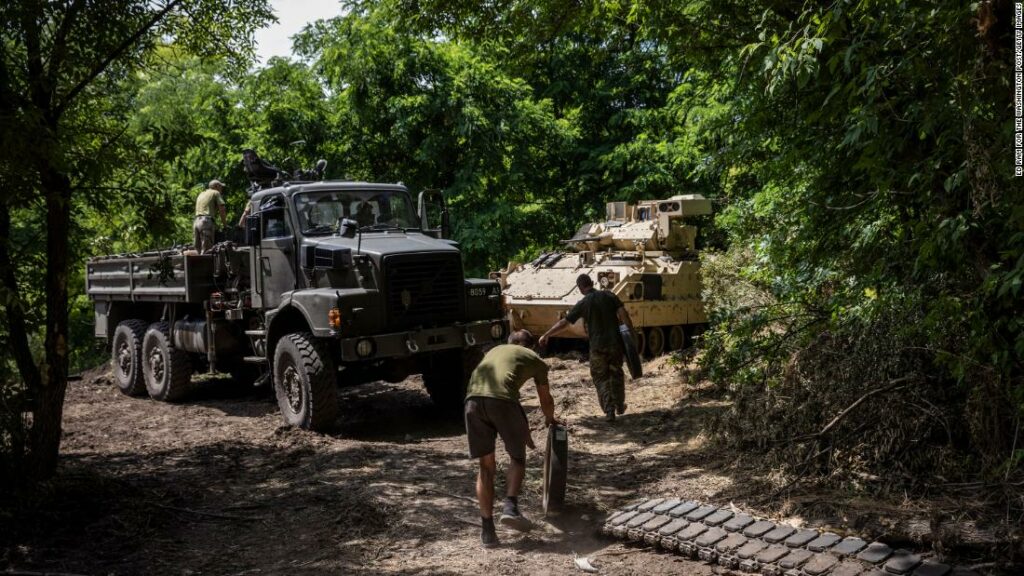White House Criticizes Russian Official’s Nuclear Weapons Comments
The White House has condemned Dmitry Medvedev, a senior Russian defense official, for suggesting that Russia may resort to nuclear weapons if Ukraine succeeds in its counteroffensive. In response, a National Security Council spokesperson labeled the rhetoric as “reckless and irresponsible.” However, the US has not observed any indications that Russia is preparing to use nuclear weapons.
“The use of nuclear weapons in Ukraine — or anywhere — would be disastrous for the world and would have severe consequences for Russia,” the spokesperson emphasized. Despite closely monitoring the situation, there is currently no reason for the US to adjust its own nuclear posture or believe that Russia is planning to deploy nuclear weapons.
Context: Medvedev, the deputy chairman of Russia’s Security Council, made these comments in a Telegram post. These remarks are the latest in a series of nuclear threats from Moscow since the start of the war against Ukraine.
“Just imagine that the offensive… in tandem with NATO, succeeded and ended up with part of our land being taken away. Then we would have to use nuclear weapons by virtue of the stipulations of the Russian Presidential Decree,” Medvedev stated. He further added, “There simply wouldn’t be any other solution. Our enemies should pray to our fighters that they do not allow the world to go up in nuclear flames.”
Contrary to Medvedev’s remarks, US President Joe Biden expressed his belief earlier this month that Russia would not deploy nuclear weapons.
Unveiling Real-Time Updates: Russia’s Ongoing Conflict in Ukraine
Introduction
The ongoing conflict between Russia and Ukraine has been a topic of international concern since its inception in 2014. The situation has evolved over time, with real-time updates shedding light on the complexities and consequences of this conflict. This article aims to provide a comprehensive overview of the conflict, highlighting the key events, geopolitical implications, and the impact on the people of Ukraine.
Background
The conflict began in 2014 when Russia annexed Crimea, a region previously under Ukrainian control. This move was met with international condemnation, as it violated Ukraine’s sovereignty and territorial integrity. Subsequently, pro-Russian separatist movements emerged in eastern Ukraine, leading to a full-blown armed conflict between Ukrainian forces and separatist groups supported by Russia.
Key Events
Since the conflict’s inception, several significant events have shaped its trajectory. In 2014, the downing of Malaysia Airlines Flight MH17, allegedly by pro-Russian separatists, shocked the world and intensified international scrutiny of Russia’s involvement. The conflict escalated further in 2015 when fighting intensified in the Donetsk and Luhansk regions, resulting in a high number of casualties and displacements.
In 2019, Ukraine held presidential elections, which saw Volodymyr Zelensky come to power. Zelensky’s presidency brought hopes of a peaceful resolution to the conflict, as he expressed a willingness to engage in dialogue with Russia. However, progress has been limited, and the conflict remains unresolved.
Geopolitical Implications
The conflict in Ukraine has significant geopolitical implications, affecting not only the region but also global dynamics. Russia’s actions in Ukraine have strained its relations with the European Union and the United States, leading to economic sanctions and diplomatic tensions. The conflict has also highlighted the vulnerability of post-Soviet states to Russian influence, raising concerns among neighboring countries about their own territorial integrity.
Humanitarian Impact
The ongoing conflict has had a devastating impact on the people of Ukraine. According to the United Nations, over 13,000 people have been killed, and more than 1.5 million have been internally displaced. The conflict has disrupted essential services, including healthcare and education, leaving many vulnerable and in need of humanitarian assistance. The situation is particularly dire in the conflict-affected areas, where access to basic necessities is limited, and infrastructure has been severely damaged.
Real-Time Updates
Real-time updates have played a crucial role in providing accurate and up-to-date information about the conflict. News agencies, social media platforms, and independent journalists have been instrumental in reporting on the ground, documenting the evolving situation, and raising awareness about the ongoing crisis. These updates have helped shape public opinion, mobilize support for Ukraine, and hold accountable those responsible for human rights violations.
Conclusion
The conflict between Russia and Ukraine remains a pressing issue, with real-time updates shedding light on its complexities and consequences. The conflict’s geopolitical implications and humanitarian impact cannot be understated, as they have far-reaching consequences for the region and beyond. It is imperative for the international community to remain engaged, support diplomatic efforts, and provide humanitarian aid to alleviate the suffering of the Ukrainian people. Only through sustained dialogue and concerted efforts can a peaceful resolution be achieved, ensuring stability and security in the region.









